

Evidence summaries and recommendations from the international evidence‐based guideline for the assessment and management of polycystic ovary syndrome: Lifestyle management - Moran - 2020 - Obesity Reviews. Polycystic ovary syndrome (PCOS) is the most common endocrine disorder affecting women of reproductive age, with a prevalence of 8%–13% according to the Rotterdam criteria.1 The Rotterdam criteria define PCOS as the presence of two of three of the following: oligo/anovulation, polycystic ovaries and clinical or biochemical hyperandrogenism.2 PCOS is a complex disorder with implications for reproductive, metabolic and psychological health.3 The current understanding of the pathophysiology of PCOS suggests that insulin resistance (IR) plays an important role in many symptoms of PCOS.
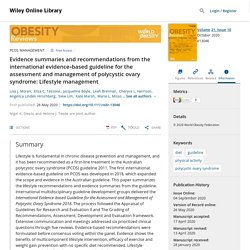
IR is present irrespective of body mass index (BMI) and affects both lean and overweight women with PCOS.4 Hyperinsulinemia resulting from IR contributes to hyperandrogenism through effects on the pituitary, liver and ovaries.5-7 IR is further exacerbated by obesity. 2.1 Interpreting the recommendations Note: GRADE note that QOE is a continuum; any discrete categorization involves a degree of arbitrariness. Medical Nutrition Therapy for Women With Polycystic Ovary Sy... : Topics in Clinical Nutrition. Gordon, Barbara MBA, RDN, LD; Agresta, Eleni MS, RDN; Keenan Isoldi, Kathy PhD, RDN; Vargas-Rodriguez, Ileana MD, MS Author Information.
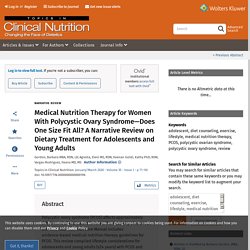
A New Approach to Polycystic Ovary Syndrome: The Gut Microbiota: Journal of the American College of Nutrition: Vol 0, No 0. Polycystic ovary syndrome (PCOS) is a widespread endocrine disease that affects 6% to 20% of women of reproductive age and is associated with high risk of infertility, obesity, and insulin resistance.
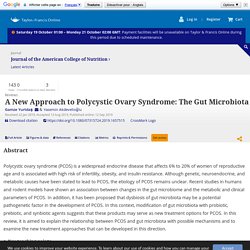
Although genetic, neuroendocrine, and metabolic causes have been stated to lead to PCOS, the etiology of PCOS remains unclear. Recent studies in humans and rodent models have shown an association between changes in the gut microbiome and the metabolic and clinical parameters of PCOS. In addition, it has been proposed that dysbiosis of gut microbiota may be a potential pathogenetic factor in the development of PCOS.
Polycystic Ovary Syndrome Awareness Month. September is Polycystic Ovary Syndrome Awareness Month and is an excellent time to focus on the latest Cochrane evidence.
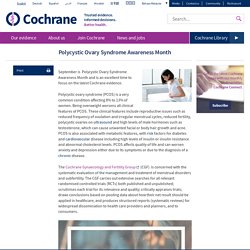
Polycystic ovary syndrome (PCOS) is a very common condition affecting 8% to 13% of women. Being overweight worsens all clinical features of PCOS. These clinical features include reproductive issues such as reduced frequency of ovulation and irregular menstrual cycles, reduced fertility, polycystic ovaries on ultrasound and high levels of male hormones such as testosterone, which can cause unwanted facial or body hair growth and acne. PCOS is also associated with metabolic features, with risk factors for diabetes and cardiovascular disease including high levels of insulin or insulin resistance and abnormal cholesterol levels.
PCOS affects quality of life and can worsen anxiety and depression either due to its symptoms or due to the diagnosis of a chronic disease. Here is a curated list of some PCOS related Cochrane systematic reviews: Exercise Recommendations for Women with Polycystic Ovary Syndrome: Is the Evidence Enough? Nigel K.
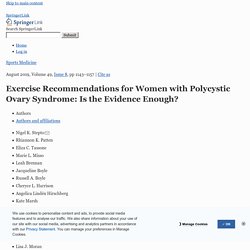
SteptoRhiannon K. PattenEliza C. TassoneMarie L. MissoLeah BrennanJacqueline BoyleRussell A. BoyleCheryce L. Current Opinion First Online: 05 June 2019 Abstract. Acupuncture for polycystic ovarian syndrome - Lim, CED - 2019. Lifestyle changes in women with polycystic ovary syndrome - Lim, SS - 2019. Overview of systematic reviews of non-pharmacological interventions in women with polycystic ovary syndrome. Polycystic Ovary Syndrome, Fertility, Diet, and Lifestyle Mo... : Topics in Clinical Nutrition. Polycystic ovary syndrome (PCOS) is a complex metabolic disorder impacting women of reproductive age.
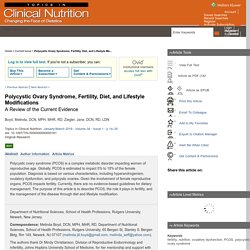
Globally, PCOS is estimated to impact 5% to 18% of the female population. Recommendations from the international evidence-based guideline for the assessment and management of polycystic ovary syndrome - Fertility and Sterility. Guideline - Monash Centre for Health Research and Implementation (MCHRI) Insulin-sensitising drugs (metformin, rosiglitazone, pioglitazone, D-chiro-inositol) for women with polycystic ovary syndrome, oligo amenorrhoea and subfertility - Morley - 2017 - The Cochrane Library. Main results We assessed the interventions metformin, clomiphene citrate, metformin plus clomiphene citrate, D-chiro-inositol, rosiglitazone and pioglitazone.
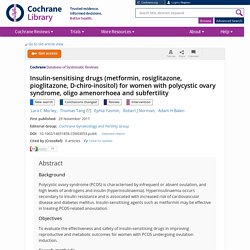
We compared these with each other, placebo or no treatment. We included 48 studies (4451 women), 42 of which investigated metformin (4024 women). Evidence quality ranged from very low to moderate. Limitations were risk of bias (poor reporting of methodology and incomplete outcome data), imprecision and inconsistency. Metformin versus placebo or no treatment The evidence suggests that metformin may improve live birth rates compared with placebo (OR 1.59, 95% CI 1.00 to 2.51, 4 studies, 435 women, I2 = 0%, low-quality evidence). Metformin plus clomiphene citrate versus clomiphene citrate alone Metformin versus clomiphene citrate When all studies were combined, findings for live birth were inconclusive and inconsistent (OR 0.71, 95% CI 0.49 to 1.01, 5 studies, 741 women, I2 = 86%, very low-quality evidence).
Authors' conclusions. Nutritional supplements and herbal medicines for women with polycystic ovary syndrome; a systematic review and meta-analysis. Data from two trials were not included in analyses.
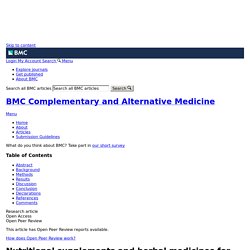
One trial used a cross-over trial design and did not report first phase outcomes [35]; the other study reported outcomes as the median rather than the mean [33]. Where data could not be included in a meta-analysis a narrative reporting of the findings was presented. Nutritional supplements for PCOS Calcium plus vitamin D Two trials (78 women) compared calcium plus vitamin D with metformin for the number of women with regular menstrual cycles (21–35 days) [47, 50].
Secondary outcomes. Nutritional support and dietary interventions for women with pco. Unit of Human Nutrition, Department of Food Science and Human Nutrition, Agricultural University of Athens, Athens, Greece Abstract: Polycystic ovary syndrome (PCOS) is a common endocrine disorder in reproductive-aged women, which leads to reproductive, metabolic and hormonal abnormalities.
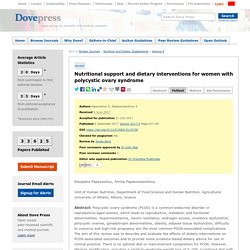
Hyperinsulinemia, insulin resistance, androgen excess, ovulatory dysfunction, polycystic ovaries, gonadotropin abnormalities, obesity, adipose tissue dysfunction, difficulty to conceive and high-risk pregnancy are the most common PCOS-associated complications. The aim of this review was to describe and evaluate the effects of dietary interventions on PCOS-associated outcomes and to provide some evidence-based dietary advice for use in clinical practice. There is no optimal diet or macronutrient composition for PCOS.
Introduction Diet and its effect on metabolic outcomes should be more thoroughly examined in women with PCOS. Reduction in IR has been suggested as the principal goal of PCOS treatment. New Data on Polycystic Ovary Syndrome - Today's Dietitian Magazine. May 2017 Issue Women's Health: New Data on Polycystic Ovary Syndrome By Angela Grassi, MS, RDN, LDN Today's Dietitian Vol. 19, No. 5, P. 12 Research shows diet and nutritional supplement interventions can help improve metabolic and reproductive health.
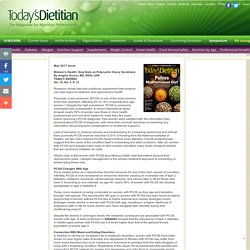
Polycystic ovary syndrome (PCOS) is one of the most common endocrine disorders, affecting 9% to 18% of reproductive age women.1 Despite the high prevalence, PCOS is commonly overlooked and undertreated. A recent international study showed nearly 50% of women saw three or more health professionals and one-third waited for more than two years before receiving a PCOS diagnosis. Few women were satisfied with the information they received about PCOS at diagnosis, with more than one-half reporting not receiving any information about long-term complications or emotional support.2 What's clear is that women with PCOS face lifelong health risks that extend beyond their reproductive years.
The results were encouraging. References 1. 2. 3. 4. 5. 6. 7. Nutrients as novel therapeutic approaches for metabolic disturbances in polycystic ovary syndrome. Diagnosis and treatment of polycystic ovary syndrome: an Endocrine Society clinical practice guideline. Definitions for the quality of the evidence (+OOO, ++OO, +++O, and ++++); the strength of the recommendation (1 or 2); and the difference between a "recommendation" and a "suggestion" are provided at the end of the "Major Recommendations" field. Diagnosis of Polycystic Ovary Syndrome (PCOS) Diagnosis in Adults The Task Force suggests that the diagnosis of PCOS be made if two of the three following criteria are met: androgen excess, ovulatory dysfunction, or polycystic ovaries (PCO) (see Tables 1 and 2 in the original guideline document), whereas disorders that mimic the clinical features of PCOS are excluded.
These include, in all women: thyroid disease, hyperprolactinemia, and nonclassic congenital adrenal hyperplasia (primarily 21-hydroxylase deficiency by serum 17-hydroxyprogesterone [17-OHP]) (see Table 3 in the original guideline document). Diagnosis in Adolescents. The polycystic ovary syndrome: a position statement from the European Society of Endocrinology. Evidence-based guideline for the assessment and management of polycystic ovary syndrome.